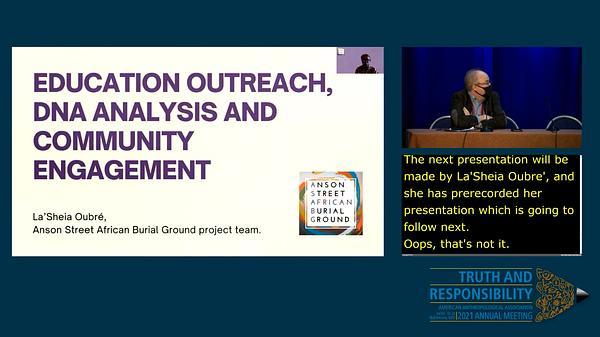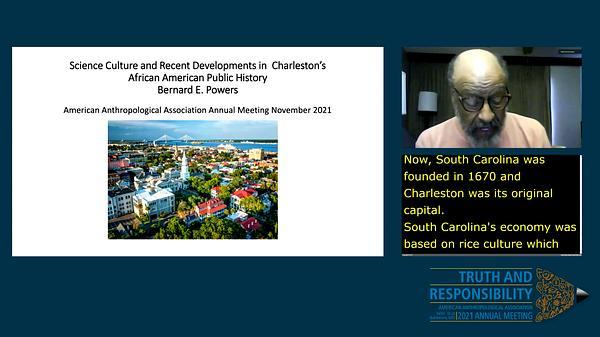Would you like to see your presentation here, made available to a global audience of researchers?
Add your own presentation or have us affordably record your next conference.
keywords:
genetics and genomics
activism
identity
The rediscovery of the New York African Burial Ground in 1991 forced anthropologists to reckon with our disciplinary history and to reconsider who directs, interprets and voices the histories of enslaved Africans and their descendants in this country. Over twenty years later, near Anson Street in downtown Charleston (South Carolina), thirty-six unmarked graves were uncovered during a construction project. Preliminary analysis indicated that the interred individuals were likely of African descent and buried in the latter part of the 18th century. In a city still grappling with its racial history and current disparities, the ancestors awoke and demanded that we bear witness to the truths they knew, treat them with honor and respect, reconcile past and present injustices and restore their humanity by sharing their stories through our work. The discovery seemed especially pertinent in the wake of the racially motivated murder of nine African Americans by a white-supremacist at Mother Emanuel AME Church, just a short distance from the burial ground, an act that prompted the Charleston City Mayor to voice his commitment to racial reconciliation. In 2017, the Gullah Society, with community and City support, was asked to guide the reinterment process for the thirty-six ancestors. Over the past two years we have sought to sensitively ensure that the identities and lives of these individuals were fully explored in order to better understand the historical experience and shared legacies of African-descended people in Charleston. An interdisciplinary anthropological investigation combining bioarchaeology and genetics with community engagement, educational outreach and arts programs was carried out with the active participation of local communities in order to characterize the lives of these individuals. In May 2019, the Anson Street Ancestors were reburied in the sacred ground where they were originally found. Inspired by conversations generated during a school program, a Naming Ceremony was held by Yorùbá Diviners prior to their reburial. The ancestors were given names inspired by their African regional identities gleaned from mitochondrial DNA and isotopic evidence and documentation of Gullah Geechee names conducted by Dr. Lorenzo Dow Turner (1949). As an acknowledgement of and in defiance of the historical restrictions on African and Gullah Geechee burial practices, the Anson Street Ancestors were carried through the streets of Charleston in a horse-drawn hearse, escorted by drummers and an Egungun masquerade, to a multi-cultural and multi-faith spiritual Reinterment Ceremony witnessed by over 500 individuals. This session showcases the two years of community-based, four-field anthropological research carried out during the Anson Street African Burial Ground Project. The presenters are members of the team that assembled to work with the community employing a racial equity lens through which we sought to undertake research, plan the reinterment ceremony, memorialize these individuals, and share the research findings. The understandings of African ancestry, past and present Gullah Geechee identities, and the life experiences of enslaved Africans that emerge from our work have helped to reshape the way that African descendant histories are presented and shared in Charleston.

